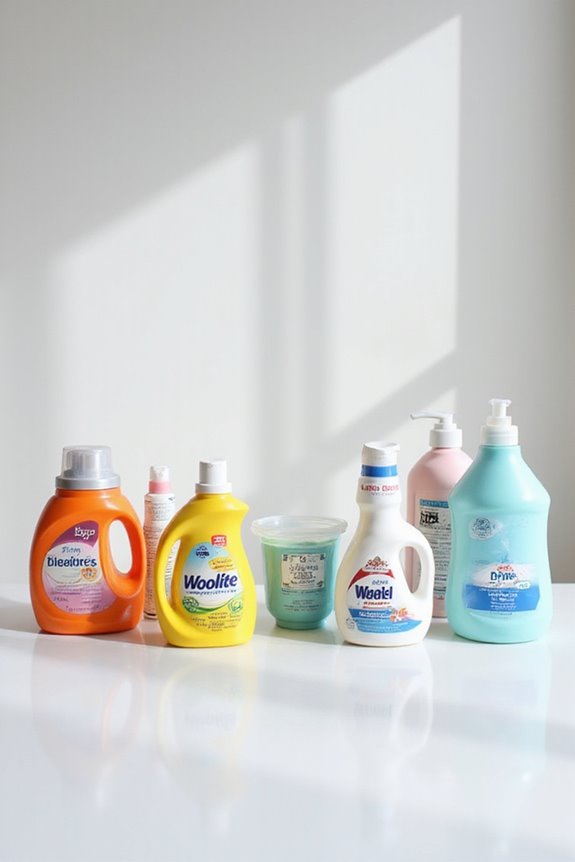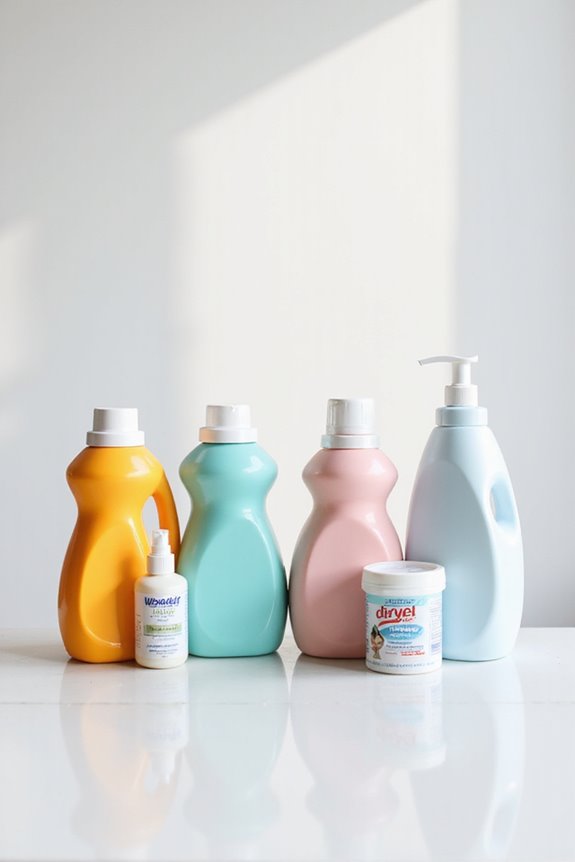Can laundry detergent remove oil stains? Yes, it can! When we use detergents with surfactants, they break down the oil and make it water-soluble. Enzyme-based detergents are especially effective as they target the fat in oil. Now, we might need to pre-treat the stain before washing, but it’s often worth it! So, if you’ve got an oily mess on your shirt, don’t worry—there’s more to learn about making it disappear!
Key Takeaways
- Laundry detergents, especially those with surfactants and enzymes, can effectively remove oil stains from fabrics.
- Liquid detergents are ideal for pretreating oil stains as they dissolve easily and leave no residue.
- Enzyme-based detergents specifically target triglycerides in oils, enhancing stain removal effectiveness.
- Pre-treating stains with detergent and allowing it to sit can significantly improve cleaning results.
- Always follow fabric care labels and wash with appropriate water temperatures for best results on oil stains.
Understanding Oil Stains and Their Composition
When we think about oil stains, it’s easy to overlook just how complex they really are. These stains are primarily made up of long carbon chain compounds, like hydrocarbons, which repel water. Their chemical structure makes them a sticky challenge. Oil stains can form films that dry quickly, making them harder to remove. Plus, they often contain dyes or pigments, adding to their complexity. We’ve all seen how these stains cling to our clothes, right? They penetrate fabric fibers and create a barrier that simple washing can’t break through. Understanding these stain characteristics helps us tackle them better. So, next time we spill something oily, we’ll be a bit more prepared for the battle ahead! Additionally, using effective surfactants or enzymes in laundry detergents can significantly enhance the stain removal process.
How Laundry Detergent Works on Oil Stains
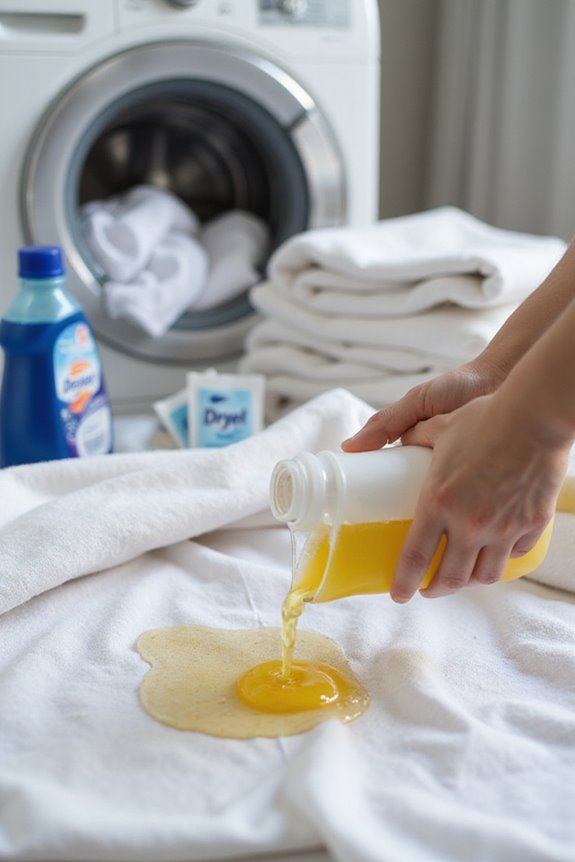
Laundry detergent works wonders on oil stains, and knowing how it does can really help us tackle those pesky messes. The magic largely lies in surfactant action. Surfactants have two ends—one loves oil, while the other loves water. They surround oil particles, forming micelles that make the oil soluble in water, which is essential for removal.
Enzyme efficacy also plays a crucial role. Lipase enzymes target triglycerides in oils, breaking them down into simpler, more manageable components. This makes it easier for the detergent to work its magic during the wash cycle. Together, surfactants and enzymes combine forces, helping us bid farewell to those stubborn oil stains. It’s like a superhero team for our laundry! Additionally, many products utilize enzyme-based formulas for tough stains, enhancing their effectiveness during the washing process.
Types of Detergents Effective for Oil Stain Removal
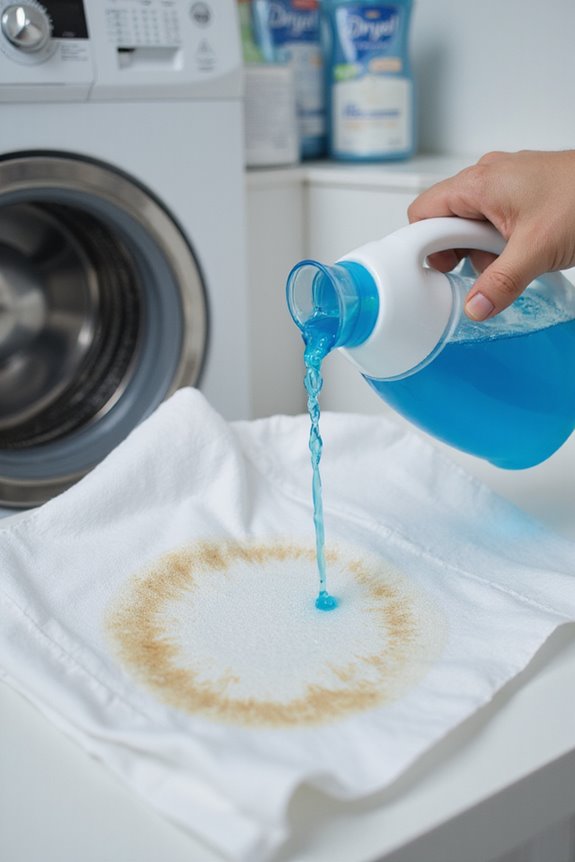
Getting rid of those pesky oil stains requires the right type of detergent. We’ve found that liquid detergents work wonders because they dissolve easily in water and leave no residue behind. They’re perfect for pretreating stains directly on fabrics, even in cold water! On the other hand, powder detergents pack a punch against tough stains but may need warm water to dissolve properly. Detergent pods are convenient but limit pretreating options. If you’re looking for eco-friendly options, there are specialty detergents and detergent sheets that balance effectiveness with environmental concerns. Don’t forget about household aids like baking soda or vinegar, which can enhance your stain-fighting game! Additionally, using enzyme technology in your detergent can significantly improve grease stain removal. With the right tools, those oil stains don’t stand a chance!
The Role of Enzymes in Oil Stain Treatment
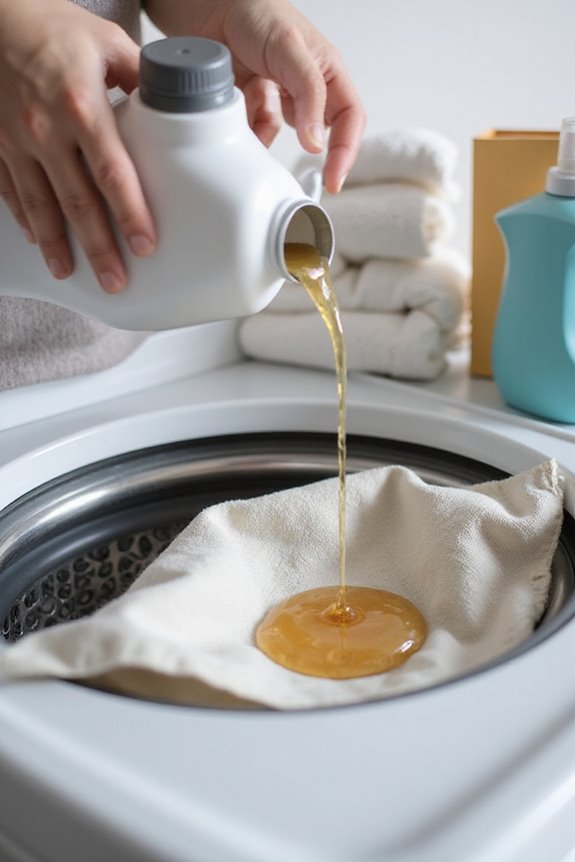
Enzymes play an essential role in tackling those stubborn oil stains we all dread. The main hero here is lipase, an enzyme that specifically targets oily messes by breaking down triglycerides into smaller, washable pieces. This enzyme specificity guarantees that only the oil molecules get tackled, leaving other stains alone. When we combine lipases with surfactants, we see some fantastic synergistic effects. The lipase breaks down the oil, while surfactants help lift those tiny droplets away. It’s like a team of superheroes working together! We’ve found that using enzyme-based detergents can considerably improve stain removal compared to regular ones. Eco-friendly options are also available, allowing you to tackle tough stains while being kind to the planet. So next time you face an oily stain, remember, enzymes are your best friends in the laundry room!
Complementary Methods for Treating Oil Stains
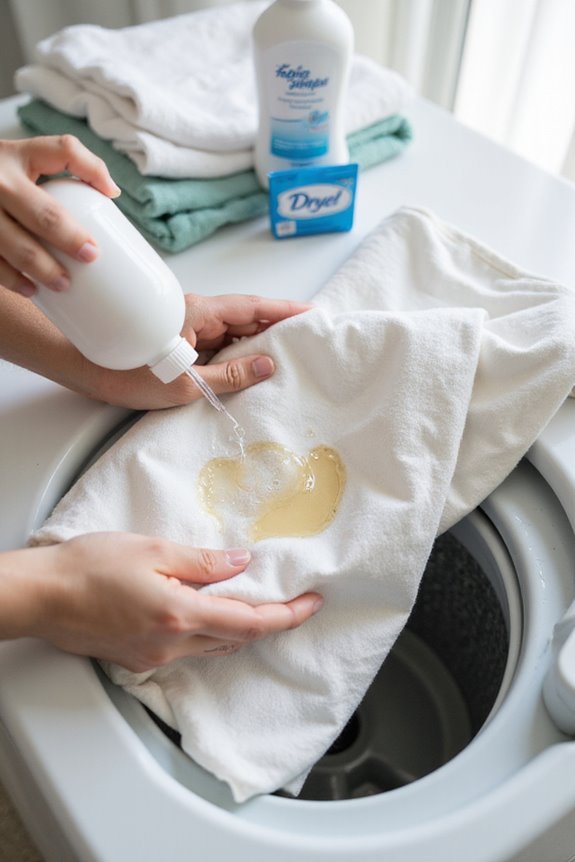
When we face the dreaded oil stain, it’s good to know we have a variety of methods at our fingertips. Using household remedies can be a game-changer! For example, we can apply Dawn dish soap directly onto the stain, which works wonders. Baking soda paste is another option; it absorbs and lifts oil effectively. Don’t forget about chalk—rubbing it on fresh stains can prevent them from setting! Soaking in a mix of white vinegar and warm water can help break down the oil too. If all else fails, HeySunday dishwasher sheets are a handy alternative. By using these complementary methods alongside our laundry detergent, we can greatly enhance stain prevention and tackle even the trickiest oil stains! Additionally, incorporating enzyme-powered formulas in your cleaning routine can help effectively break down tough grease stains.
Best Practices for Washing Oily Fabrics
Washing oily fabrics can feel like a challenging task, but it doesn’t have to be! First, we need to take into account pretreatment techniques. Applying a small amount of enzyme-based detergent directly to the oil stain helps break it down before washing. We can gently rub it in with a soft toothbrush for better penetration.
Next, let’s think about fabric compatibility. For sturdy fabrics like cotton, stronger detergents work well. However, delicate fabrics, like wool, need special detergents to avoid damage. We’ve found that letting treated stains soak for about 15–30 minutes can really boost the cleaning power. Remember, it’s all about choosing the right products and techniques to keep our clothes looking great while tackling those pesky oil stains! Additionally, using products with advanced stain removal power can significantly enhance the effectiveness against greasy stains.
Washing Conditions That Enhance Oil Stain Removal
To tackle those stubborn oil stains, we need to pay attention to the washing conditions we choose. First, let’s consider our washing temperature. Warm water is great, as it helps dissolve oils and boost detergent effectiveness. However, we should respect garment labels to avoid damage. Next, we can utilize pre-soak techniques. Applying a grease-cutting detergent directly to the stain and letting it sit for 15–30 minutes can work wonders. Gentle rubbing can help too! Choosing longer wash cycles increases agitation, aiding oil removal. Plus, we shouldn’t overload the machine; clothes need space to move around. By combining these strategies, we can improve our chances of banishing those pesky oil stains for good!
Limitations of Laundry Detergents on Oil Stains
Although laundry detergents are our go-to for getting rid of oil stains, they come with some limitations that we need to keep in mind. For starters, detergent limitations can hinder our efforts, especially if we’re dealing with thick or embedded oil stains. Some oils have tough molecular bonds that conventional detergents can’t break down without a little help. Plus, using the wrong detergent for our washing machine can lead to greasy residue that looks like an oil stain! Delicate fabrics also limit how strong our detergent can be. And let’s not forget that not all detergents have the enzymes needed to tackle different oil compositions. So, while detergents are useful, they might not always be the magic solution we hope for!
Tips for Successful Oil Stain Removal
When it comes to tackling oil stains, having a solid game plan can make all the difference. First, we should consider some effective pre-treatment techniques. For instance, applying a paste of baking soda and water directly onto the stain can absorb excess oil. If the fabric type allows, we can also dab liquid detergent on fresh stains and let it sit.
After pre-treatment, it’s essential to use a good quality laundry detergent, preferably enzyme-based, for washing. Remember, cold or cool water is our friend here, especially for delicate fabrics like silk. Finally, if a stubborn stain persists, don’t hesitate to repeat the process. Oil stains can be tricky, but with our combined efforts, we can conquer them!
Frequently Asked Questions
Can I Use Fabric Softener With Oil Stain Removal?
When it comes to fabric softener effectiveness during oil stain treatment, we should avoid using it in the same wash cycle. It can hinder stain removal, so let’s save it for the rinse cycle instead.
Are Homemade Stain Removers as Effective as Commercial Products?
When comparing homemade recipes to commercial products, we’ve found that while homemade solutions can be effective, they often require more effort and time. Commercial products typically offer better stain effectiveness, especially on tougher stains.
How Long Should I Let Detergent Sit on an Oil Stain?
When we think about detergent effectiveness and stain removal techniques, we should let detergent sit on oil stains for 15 to 30 minutes. This time enhances its ability to break down those stubborn stains effectively.
Can Oil Stains Come Back After Washing?
We’ve noticed that oil stain persistence can occur despite washing. By using proper washing techniques, like pretreating stains and avoiding heat, we can minimize the chances of those pesky stains reappearing after laundry day.
Is It Safe to Dry Clean Oily Garments?
Did you know nearly 60% of garments labeled “dry clean only” contain delicate fabrics? We find that dry cleaning methods offer safe oil stain treatment, preserving fabric integrity while effectively tackling stubborn oil stains without risking damage.

